-
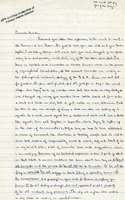 Letter from Nuh Abdul Qaiyum to Frankye Adams-Johnson (Malika), December 18-19, 1976.
Letter from Nuh Abdul Qaiyum to Frankye Adams-Johnson (Malika), December 18-19, 1976. In this letter, Frankye Adams-Johnson (Malika)’s husband, Nuh Abdul Qaiyum, who is imprisoned, expresses his gratitude for his wife and updates her on developments within the Black Panther Party and other legal proceedings. He expresses his awareness of his own mind, his beliefs, the best outlook for the people, and his nature as a man.
-
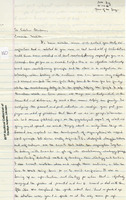 Letter from Nuh Abdul Qaiyum to Frankye Adams-Johnson (Malika), December 20, 1976.
Letter from Nuh Abdul Qaiyum to Frankye Adams-Johnson (Malika), December 20, 1976. A letter from Nuh Abdul Qaiyum, who was sentenced to prison in 1975 for a 1971 Black Liberation Army (BLA) connected shooting of police officers in New York, to his wife Frankye Adams-Johnson (Malika). He expresses his feelings about their marriage and explains how to win and organize as a people. Page 5 includes a short poem about love.
-
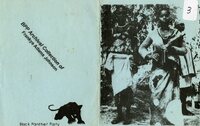 Postcard from Nuh Abdul Qaiyum to Frankye Adams-Johnson (Malika), January 22, 1975.
Postcard from Nuh Abdul Qaiyum to Frankye Adams-Johnson (Malika), January 22, 1975. In this postcard, Frankye Adams-Johnson (Malika)’s husband, Nuh Abdul Qaiyum, who is imprisoned, writes about seeing a young family member and the good that does for him. He updates his wife on the current situation with some of the comrades in the Black Panther Party. He mentions the solutions he must create and says he has much to learn.
-
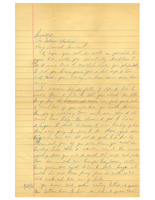 Letter from Frankye Adams-Johnson (Malika) to Nuh Abdul Qaiyum, January 23, 1974.
Letter from Frankye Adams-Johnson (Malika) to Nuh Abdul Qaiyum, January 23, 1974. A letter from Frankye Adams-Johnson (Malika) to her husband, Nuh Abdul Qaiyum, who was sentenced to prison in 1975 for a 1971 Black Liberation Army (BLA) connected shooting of police officers in New York. She expresses her desire for a normal family life and writes about her mental health in the face of this test to their relationship.
-
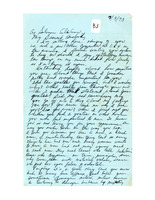 Letter from Frankye Adams-Johnson (Malika) to Nuh Abdul Qaiyum, July 9, 1973.
Letter from Frankye Adams-Johnson (Malika) to Nuh Abdul Qaiyum, July 9, 1973. A letter from Frankye Adams-Johnson (Malika) to her husband, Nuh Abdul Qaiyum, who was sentenced to prison in 1975 for a 1971 Black Liberation Army (BLA) connected shooting of police officers in New York. She expresses her deep love for him and her resentment at the police for not allowing them to be together. She also writes about her faith.
-
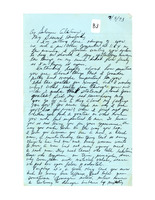 Letter from Frankye Adams-Johnson (Malika) to Nuh Abdul Qaiyum, June 11, 1973.
Letter from Frankye Adams-Johnson (Malika) to Nuh Abdul Qaiyum, June 11, 1973. A letter from Frankye Adams-Johnson (Malika) to her husband, Nuh Abdul Qaiyum, who was sentenced to prison in 1975 for a 1971 Black Liberation Army (BLA) connected shooting of police officers in New York. She writes about the grief and pain they are feeling and she warns of their oppressors and their plans.
-
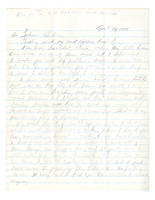 Letter from Frankye Adams-Johnson (Malika) to Nuh Abdul Qaiyum, April 19, 1973,
Letter from Frankye Adams-Johnson (Malika) to Nuh Abdul Qaiyum, April 19, 1973, A letter from Frankye Adams-Johnson (Malika) to her husband, Nuh Abdul Qaiyum, who was sentenced to prison in 1975 for a 1971 Black Liberation Army (BLA) connected shooting of police officers in New York. She writes about her mental health and asks about his physical health.
-
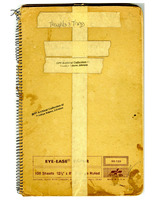 Journal 4: Nuh: Thoughts and Things, written by Nuh Abdul Qaiyum and Frankye Adams-Johnson, unknown dates.
Journal 4: Nuh: Thoughts and Things, written by Nuh Abdul Qaiyum and Frankye Adams-Johnson, unknown dates. A journal written by Nuh Abdul Qaiyum while imprisoned and later by Frankye Adams-Johnson (Malika), both former members of the Black Panther Party and the Black Liberation Army. Washington wrote poetry and essays and thoughts on philosophy and religion. Frankye Adams-Johnson (Malika) wrote poetry; drafts of letters; and meeting agendas.
-
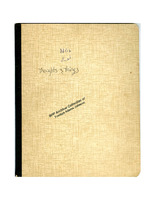 Journal 3: Nuh: Thoughts and Things, written by Nuh Abdul Qaiyum, 1975-1977.
Journal 3: Nuh: Thoughts and Things, written by Nuh Abdul Qaiyum, 1975-1977. A journal written by Frankye Adam-Johnson (Malika)’s husband, former member of the Black Panther Party and Black Liberation Army Nuh Abdul Qaiyum, from 1975-1977 while imprisoned. Most of the pages are original poetry. He also copied some poems and songs by other writers. There are also several pages of Suras and other verses from the Quran.
-
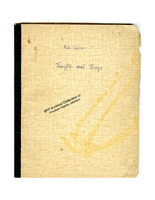 Journal 2: Thoughts and Things, written by Nuh Abdul Qaiyum, unknown dates.
Journal 2: Thoughts and Things, written by Nuh Abdul Qaiyum, unknown dates. A journal written by Frankye Adam-Johnson (Malika)’s husband, Nuh Abdul Qaiyum, during unknown dates. Nuh Abdul Qaiyum was a former member of the Black Panther Party and Black Liberation Army and was imprisoned in 1975. He writes about a variety of topics, including daily rituals; religions; languages and alphabets; and politics and philosophy.
-
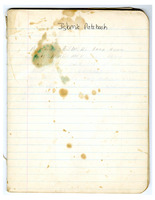 Journal 1: Islamic Notebook, written by Frankye Adams-Johnson, unknown dates.
Journal 1: Islamic Notebook, written by Frankye Adams-Johnson, unknown dates. A journal written by former Black Panther Party member and former Jackson State University professor Frankye Adams-Johnson (Malika) on unknown dates. Items in the journal include: prayers; writing in Arabic and lists of Islamic terms; rough draft of a resume for a prospective job in Philadelphia, PA; a poem; and a note to her imprisoned husband.
-
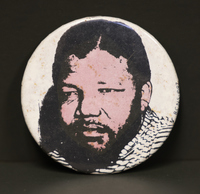 Nelson Mandela, Button.
Nelson Mandela, Button. A button with a sketch of a photo of Nelson Mandela. Nelson Mandella was an anti-apartheid activist in South Africa. After being imprisoned for 27 years due to his African Nationalist ideology, he was released in 1990 and led efforts to end apartheid. He was elected president in 1994 in the country's first fully democratic election.
-
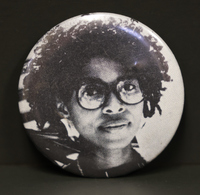 Assata Shakur, Button.
Assata Shakur, Button. A button with a black and white photo of Assata Shakur. She is a political activist and was a member of the Black Liberation Army (BLA), an organization that engaged in armed struggle with the U.S. government. In 1977, she was convicted in a cop-killing case from 1973. Escaping prison in 1979, she has lived in political asylum in Cuba ever since.
-
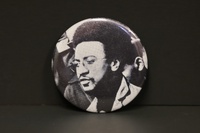 H. Rap Brown (Jamil Al-Amin), Button.
H. Rap Brown (Jamil Al-Amin), Button. A button with a black and white photo of H. Rap Brown (Jamil Al-Amin). After organizing in Mississippi during Freedom Summer in 1964, H. Rap Brown became chairman of the Student Nonviolent Coordinating Committee (SNCC) in 1967. He continued SNCC’s adoption of Black Power ideologies which began under his predecessor Stokely Carmichael.
-
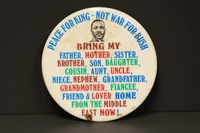 Peace for King-Not War For Bush, Button.
Peace for King-Not War For Bush, Button. A white button with a picture of Dr. Martin Luther King. The text says "Peace for King-Not War for Bush: Bring my father, mother, sister, brother, daughter, cousin, aunt, uncle, niece, nephew, grandfather, grandmother, fiancee, friend & lover home from the Middle East now!"
-
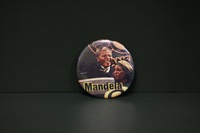 Mandela, Button.
Mandela, Button. A multi-colored button with a picture of Nelson and Winnie Mandela. Nelson Mandella was an anti-apartheid activist in South Africa. After being imprisoned for 27 years due to his African Nationalist ideology, he was released in 1990 and led efforts to end apartheid. He was elected president in 1994 in the country's first fully democratic election.
-
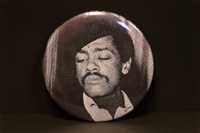 Bobby Seale, Button.
Bobby Seale, Button. A button with a black and white photo of Bobby Seale. The Black Panther Party for Self Defense was founded in 1966 by Bobby Seale and Huey P. Newton in Oakland, California. Rooted in Black Power and Maxist-Leninist ideologies, the Black Panther Party would soon spread with branches all over the United States.
-
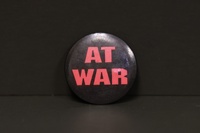 At War, Button.
At War, Button. A black and red button with the slogan "At War."
-
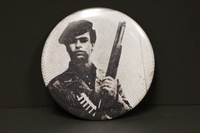 Huey Newton, Button.
Huey Newton, Button. A button with a black and white photo of Huey Newton holding a shotgun. Huey Newton, alongside Bobby Seale, founded the Black Party for Self Defense in Oakland, California in 1966. The Black Panther Party held an ideology of armed self-defense against the oppressive and racist forces of the United States government and police.
-
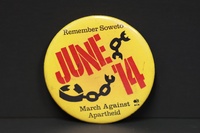 Remember Soweto June 14 March Against Apartheid, Button.
Remember Soweto June 14 March Against Apartheid, Button. A gold button with a drawing of a broken shackle and chain with the text "Remember Soweto June 14 March Against Apartheid." On June 14, 1986, 40,000 people rallied in Central Park in New York City to call on President Ronald Reagan to impose strict economic sanctions on the government of South Africa as a means to ending apartheid in the country.
-
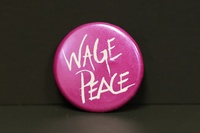 Wage Peace, Button.
Wage Peace, Button. A purple button with text that says "Wage Peace." The phrase was popularized in a speech given by President Dwight D. Eisenhower in 1953 during the Cold War. “Wage Peace” went on to be a rally cry for the anti-war and peace movements, especially during the Vietnam War.
-
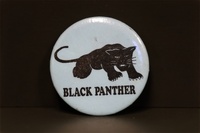 Black Panther Logo, Button.
Black Panther Logo, Button. A blue button with the Black Panther logo and text that says “Black Panther.” The Black Panther Party for Self Defense was founded in 1966 by Bobby Seale and Huey P. Newton in Oakland, California. Rooted in Black Power and Maxist-Leninist ideologies, the Black Panther Party would soon spread with branches all over the United States.
-
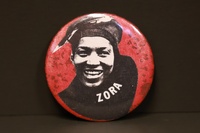 Zora Zora Neal Hurston, Button.
Zora Zora Neal Hurston, Button. A multi-colored button with a photo of Zora Neal Hurston. The text reads “Zora.” Zora Neal Hurston was an author, filmmaker, and researcher, with a focus on African American and Caribbean folklore. Her most famous novel is “Their Eyes Were Watching God” and she wrote over 50 other works, including novels, short stories, plays, and essays.
-
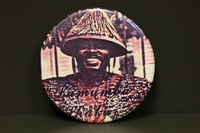 Lumumba Shakur, Button.
Lumumba Shakur, Button. A multi-colored button with a photo of Lumumba Shakur. He was the first husband of Afeni Shakur and the two worked with the Black Panther Party in Harlem, New York, helping Black tenants organize rent strikes for adequate housing. In 1969, they were charged with conspiracy to bomb police buildings along with 19 others, known as the Panther 21.
-
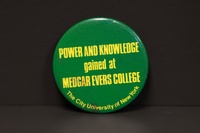 Power and Knowledge Gained at Medgar Evers College, Button.
Power and Knowledge Gained at Medgar Evers College, Button. A green button that says: "Power and knowledge gained at Medgar Evers College." Text on the bottom of the button also says: "The City University of New York." Medgar Evers College was established in Brooklyn, New York, in 1970 as part of the Central University of New York (CUNY). The college is a public, 4-year, degree granting institution.
 Letter from Nuh Abdul Qaiyum to Frankye Adams-Johnson (Malika), December 18-19, 1976. In this letter, Frankye Adams-Johnson (Malika)’s husband, Nuh Abdul Qaiyum, who is imprisoned, expresses his gratitude for his wife and updates her on developments within the Black Panther Party and other legal proceedings. He expresses his awareness of his own mind, his beliefs, the best outlook for the people, and his nature as a man.
Letter from Nuh Abdul Qaiyum to Frankye Adams-Johnson (Malika), December 18-19, 1976. In this letter, Frankye Adams-Johnson (Malika)’s husband, Nuh Abdul Qaiyum, who is imprisoned, expresses his gratitude for his wife and updates her on developments within the Black Panther Party and other legal proceedings. He expresses his awareness of his own mind, his beliefs, the best outlook for the people, and his nature as a man. Letter from Nuh Abdul Qaiyum to Frankye Adams-Johnson (Malika), December 20, 1976. A letter from Nuh Abdul Qaiyum, who was sentenced to prison in 1975 for a 1971 Black Liberation Army (BLA) connected shooting of police officers in New York, to his wife Frankye Adams-Johnson (Malika). He expresses his feelings about their marriage and explains how to win and organize as a people. Page 5 includes a short poem about love.
Letter from Nuh Abdul Qaiyum to Frankye Adams-Johnson (Malika), December 20, 1976. A letter from Nuh Abdul Qaiyum, who was sentenced to prison in 1975 for a 1971 Black Liberation Army (BLA) connected shooting of police officers in New York, to his wife Frankye Adams-Johnson (Malika). He expresses his feelings about their marriage and explains how to win and organize as a people. Page 5 includes a short poem about love. Postcard from Nuh Abdul Qaiyum to Frankye Adams-Johnson (Malika), January 22, 1975. In this postcard, Frankye Adams-Johnson (Malika)’s husband, Nuh Abdul Qaiyum, who is imprisoned, writes about seeing a young family member and the good that does for him. He updates his wife on the current situation with some of the comrades in the Black Panther Party. He mentions the solutions he must create and says he has much to learn.
Postcard from Nuh Abdul Qaiyum to Frankye Adams-Johnson (Malika), January 22, 1975. In this postcard, Frankye Adams-Johnson (Malika)’s husband, Nuh Abdul Qaiyum, who is imprisoned, writes about seeing a young family member and the good that does for him. He updates his wife on the current situation with some of the comrades in the Black Panther Party. He mentions the solutions he must create and says he has much to learn. Letter from Frankye Adams-Johnson (Malika) to Nuh Abdul Qaiyum, January 23, 1974. A letter from Frankye Adams-Johnson (Malika) to her husband, Nuh Abdul Qaiyum, who was sentenced to prison in 1975 for a 1971 Black Liberation Army (BLA) connected shooting of police officers in New York. She expresses her desire for a normal family life and writes about her mental health in the face of this test to their relationship.
Letter from Frankye Adams-Johnson (Malika) to Nuh Abdul Qaiyum, January 23, 1974. A letter from Frankye Adams-Johnson (Malika) to her husband, Nuh Abdul Qaiyum, who was sentenced to prison in 1975 for a 1971 Black Liberation Army (BLA) connected shooting of police officers in New York. She expresses her desire for a normal family life and writes about her mental health in the face of this test to their relationship. Letter from Frankye Adams-Johnson (Malika) to Nuh Abdul Qaiyum, July 9, 1973. A letter from Frankye Adams-Johnson (Malika) to her husband, Nuh Abdul Qaiyum, who was sentenced to prison in 1975 for a 1971 Black Liberation Army (BLA) connected shooting of police officers in New York. She expresses her deep love for him and her resentment at the police for not allowing them to be together. She also writes about her faith.
Letter from Frankye Adams-Johnson (Malika) to Nuh Abdul Qaiyum, July 9, 1973. A letter from Frankye Adams-Johnson (Malika) to her husband, Nuh Abdul Qaiyum, who was sentenced to prison in 1975 for a 1971 Black Liberation Army (BLA) connected shooting of police officers in New York. She expresses her deep love for him and her resentment at the police for not allowing them to be together. She also writes about her faith. Letter from Frankye Adams-Johnson (Malika) to Nuh Abdul Qaiyum, June 11, 1973. A letter from Frankye Adams-Johnson (Malika) to her husband, Nuh Abdul Qaiyum, who was sentenced to prison in 1975 for a 1971 Black Liberation Army (BLA) connected shooting of police officers in New York. She writes about the grief and pain they are feeling and she warns of their oppressors and their plans.
Letter from Frankye Adams-Johnson (Malika) to Nuh Abdul Qaiyum, June 11, 1973. A letter from Frankye Adams-Johnson (Malika) to her husband, Nuh Abdul Qaiyum, who was sentenced to prison in 1975 for a 1971 Black Liberation Army (BLA) connected shooting of police officers in New York. She writes about the grief and pain they are feeling and she warns of their oppressors and their plans. Letter from Frankye Adams-Johnson (Malika) to Nuh Abdul Qaiyum, April 19, 1973, A letter from Frankye Adams-Johnson (Malika) to her husband, Nuh Abdul Qaiyum, who was sentenced to prison in 1975 for a 1971 Black Liberation Army (BLA) connected shooting of police officers in New York. She writes about her mental health and asks about his physical health.
Letter from Frankye Adams-Johnson (Malika) to Nuh Abdul Qaiyum, April 19, 1973, A letter from Frankye Adams-Johnson (Malika) to her husband, Nuh Abdul Qaiyum, who was sentenced to prison in 1975 for a 1971 Black Liberation Army (BLA) connected shooting of police officers in New York. She writes about her mental health and asks about his physical health. Journal 4: Nuh: Thoughts and Things, written by Nuh Abdul Qaiyum and Frankye Adams-Johnson, unknown dates. A journal written by Nuh Abdul Qaiyum while imprisoned and later by Frankye Adams-Johnson (Malika), both former members of the Black Panther Party and the Black Liberation Army. Washington wrote poetry and essays and thoughts on philosophy and religion. Frankye Adams-Johnson (Malika) wrote poetry; drafts of letters; and meeting agendas.
Journal 4: Nuh: Thoughts and Things, written by Nuh Abdul Qaiyum and Frankye Adams-Johnson, unknown dates. A journal written by Nuh Abdul Qaiyum while imprisoned and later by Frankye Adams-Johnson (Malika), both former members of the Black Panther Party and the Black Liberation Army. Washington wrote poetry and essays and thoughts on philosophy and religion. Frankye Adams-Johnson (Malika) wrote poetry; drafts of letters; and meeting agendas. Journal 3: Nuh: Thoughts and Things, written by Nuh Abdul Qaiyum, 1975-1977. A journal written by Frankye Adam-Johnson (Malika)’s husband, former member of the Black Panther Party and Black Liberation Army Nuh Abdul Qaiyum, from 1975-1977 while imprisoned. Most of the pages are original poetry. He also copied some poems and songs by other writers. There are also several pages of Suras and other verses from the Quran.
Journal 3: Nuh: Thoughts and Things, written by Nuh Abdul Qaiyum, 1975-1977. A journal written by Frankye Adam-Johnson (Malika)’s husband, former member of the Black Panther Party and Black Liberation Army Nuh Abdul Qaiyum, from 1975-1977 while imprisoned. Most of the pages are original poetry. He also copied some poems and songs by other writers. There are also several pages of Suras and other verses from the Quran. Journal 2: Thoughts and Things, written by Nuh Abdul Qaiyum, unknown dates. A journal written by Frankye Adam-Johnson (Malika)’s husband, Nuh Abdul Qaiyum, during unknown dates. Nuh Abdul Qaiyum was a former member of the Black Panther Party and Black Liberation Army and was imprisoned in 1975. He writes about a variety of topics, including daily rituals; religions; languages and alphabets; and politics and philosophy.
Journal 2: Thoughts and Things, written by Nuh Abdul Qaiyum, unknown dates. A journal written by Frankye Adam-Johnson (Malika)’s husband, Nuh Abdul Qaiyum, during unknown dates. Nuh Abdul Qaiyum was a former member of the Black Panther Party and Black Liberation Army and was imprisoned in 1975. He writes about a variety of topics, including daily rituals; religions; languages and alphabets; and politics and philosophy. Journal 1: Islamic Notebook, written by Frankye Adams-Johnson, unknown dates. A journal written by former Black Panther Party member and former Jackson State University professor Frankye Adams-Johnson (Malika) on unknown dates. Items in the journal include: prayers; writing in Arabic and lists of Islamic terms; rough draft of a resume for a prospective job in Philadelphia, PA; a poem; and a note to her imprisoned husband.
Journal 1: Islamic Notebook, written by Frankye Adams-Johnson, unknown dates. A journal written by former Black Panther Party member and former Jackson State University professor Frankye Adams-Johnson (Malika) on unknown dates. Items in the journal include: prayers; writing in Arabic and lists of Islamic terms; rough draft of a resume for a prospective job in Philadelphia, PA; a poem; and a note to her imprisoned husband. Nelson Mandela, Button. A button with a sketch of a photo of Nelson Mandela. Nelson Mandella was an anti-apartheid activist in South Africa. After being imprisoned for 27 years due to his African Nationalist ideology, he was released in 1990 and led efforts to end apartheid. He was elected president in 1994 in the country's first fully democratic election.
Nelson Mandela, Button. A button with a sketch of a photo of Nelson Mandela. Nelson Mandella was an anti-apartheid activist in South Africa. After being imprisoned for 27 years due to his African Nationalist ideology, he was released in 1990 and led efforts to end apartheid. He was elected president in 1994 in the country's first fully democratic election. Assata Shakur, Button. A button with a black and white photo of Assata Shakur. She is a political activist and was a member of the Black Liberation Army (BLA), an organization that engaged in armed struggle with the U.S. government. In 1977, she was convicted in a cop-killing case from 1973. Escaping prison in 1979, she has lived in political asylum in Cuba ever since.
Assata Shakur, Button. A button with a black and white photo of Assata Shakur. She is a political activist and was a member of the Black Liberation Army (BLA), an organization that engaged in armed struggle with the U.S. government. In 1977, she was convicted in a cop-killing case from 1973. Escaping prison in 1979, she has lived in political asylum in Cuba ever since. H. Rap Brown (Jamil Al-Amin), Button. A button with a black and white photo of H. Rap Brown (Jamil Al-Amin). After organizing in Mississippi during Freedom Summer in 1964, H. Rap Brown became chairman of the Student Nonviolent Coordinating Committee (SNCC) in 1967. He continued SNCC’s adoption of Black Power ideologies which began under his predecessor Stokely Carmichael.
H. Rap Brown (Jamil Al-Amin), Button. A button with a black and white photo of H. Rap Brown (Jamil Al-Amin). After organizing in Mississippi during Freedom Summer in 1964, H. Rap Brown became chairman of the Student Nonviolent Coordinating Committee (SNCC) in 1967. He continued SNCC’s adoption of Black Power ideologies which began under his predecessor Stokely Carmichael. Peace for King-Not War For Bush, Button. A white button with a picture of Dr. Martin Luther King. The text says "Peace for King-Not War for Bush: Bring my father, mother, sister, brother, daughter, cousin, aunt, uncle, niece, nephew, grandfather, grandmother, fiancee, friend & lover home from the Middle East now!"
Peace for King-Not War For Bush, Button. A white button with a picture of Dr. Martin Luther King. The text says "Peace for King-Not War for Bush: Bring my father, mother, sister, brother, daughter, cousin, aunt, uncle, niece, nephew, grandfather, grandmother, fiancee, friend & lover home from the Middle East now!" Mandela, Button. A multi-colored button with a picture of Nelson and Winnie Mandela. Nelson Mandella was an anti-apartheid activist in South Africa. After being imprisoned for 27 years due to his African Nationalist ideology, he was released in 1990 and led efforts to end apartheid. He was elected president in 1994 in the country's first fully democratic election.
Mandela, Button. A multi-colored button with a picture of Nelson and Winnie Mandela. Nelson Mandella was an anti-apartheid activist in South Africa. After being imprisoned for 27 years due to his African Nationalist ideology, he was released in 1990 and led efforts to end apartheid. He was elected president in 1994 in the country's first fully democratic election. Bobby Seale, Button. A button with a black and white photo of Bobby Seale. The Black Panther Party for Self Defense was founded in 1966 by Bobby Seale and Huey P. Newton in Oakland, California. Rooted in Black Power and Maxist-Leninist ideologies, the Black Panther Party would soon spread with branches all over the United States.
Bobby Seale, Button. A button with a black and white photo of Bobby Seale. The Black Panther Party for Self Defense was founded in 1966 by Bobby Seale and Huey P. Newton in Oakland, California. Rooted in Black Power and Maxist-Leninist ideologies, the Black Panther Party would soon spread with branches all over the United States. At War, Button. A black and red button with the slogan "At War."
At War, Button. A black and red button with the slogan "At War." Huey Newton, Button. A button with a black and white photo of Huey Newton holding a shotgun. Huey Newton, alongside Bobby Seale, founded the Black Party for Self Defense in Oakland, California in 1966. The Black Panther Party held an ideology of armed self-defense against the oppressive and racist forces of the United States government and police.
Huey Newton, Button. A button with a black and white photo of Huey Newton holding a shotgun. Huey Newton, alongside Bobby Seale, founded the Black Party for Self Defense in Oakland, California in 1966. The Black Panther Party held an ideology of armed self-defense against the oppressive and racist forces of the United States government and police. Remember Soweto June 14 March Against Apartheid, Button. A gold button with a drawing of a broken shackle and chain with the text "Remember Soweto June 14 March Against Apartheid." On June 14, 1986, 40,000 people rallied in Central Park in New York City to call on President Ronald Reagan to impose strict economic sanctions on the government of South Africa as a means to ending apartheid in the country.
Remember Soweto June 14 March Against Apartheid, Button. A gold button with a drawing of a broken shackle and chain with the text "Remember Soweto June 14 March Against Apartheid." On June 14, 1986, 40,000 people rallied in Central Park in New York City to call on President Ronald Reagan to impose strict economic sanctions on the government of South Africa as a means to ending apartheid in the country. Wage Peace, Button. A purple button with text that says "Wage Peace." The phrase was popularized in a speech given by President Dwight D. Eisenhower in 1953 during the Cold War. “Wage Peace” went on to be a rally cry for the anti-war and peace movements, especially during the Vietnam War.
Wage Peace, Button. A purple button with text that says "Wage Peace." The phrase was popularized in a speech given by President Dwight D. Eisenhower in 1953 during the Cold War. “Wage Peace” went on to be a rally cry for the anti-war and peace movements, especially during the Vietnam War. Black Panther Logo, Button. A blue button with the Black Panther logo and text that says “Black Panther.” The Black Panther Party for Self Defense was founded in 1966 by Bobby Seale and Huey P. Newton in Oakland, California. Rooted in Black Power and Maxist-Leninist ideologies, the Black Panther Party would soon spread with branches all over the United States.
Black Panther Logo, Button. A blue button with the Black Panther logo and text that says “Black Panther.” The Black Panther Party for Self Defense was founded in 1966 by Bobby Seale and Huey P. Newton in Oakland, California. Rooted in Black Power and Maxist-Leninist ideologies, the Black Panther Party would soon spread with branches all over the United States. Zora Zora Neal Hurston, Button. A multi-colored button with a photo of Zora Neal Hurston. The text reads “Zora.” Zora Neal Hurston was an author, filmmaker, and researcher, with a focus on African American and Caribbean folklore. Her most famous novel is “Their Eyes Were Watching God” and she wrote over 50 other works, including novels, short stories, plays, and essays.
Zora Zora Neal Hurston, Button. A multi-colored button with a photo of Zora Neal Hurston. The text reads “Zora.” Zora Neal Hurston was an author, filmmaker, and researcher, with a focus on African American and Caribbean folklore. Her most famous novel is “Their Eyes Were Watching God” and she wrote over 50 other works, including novels, short stories, plays, and essays. Lumumba Shakur, Button. A multi-colored button with a photo of Lumumba Shakur. He was the first husband of Afeni Shakur and the two worked with the Black Panther Party in Harlem, New York, helping Black tenants organize rent strikes for adequate housing. In 1969, they were charged with conspiracy to bomb police buildings along with 19 others, known as the Panther 21.
Lumumba Shakur, Button. A multi-colored button with a photo of Lumumba Shakur. He was the first husband of Afeni Shakur and the two worked with the Black Panther Party in Harlem, New York, helping Black tenants organize rent strikes for adequate housing. In 1969, they were charged with conspiracy to bomb police buildings along with 19 others, known as the Panther 21. Power and Knowledge Gained at Medgar Evers College, Button. A green button that says: "Power and knowledge gained at Medgar Evers College." Text on the bottom of the button also says: "The City University of New York." Medgar Evers College was established in Brooklyn, New York, in 1970 as part of the Central University of New York (CUNY). The college is a public, 4-year, degree granting institution.
Power and Knowledge Gained at Medgar Evers College, Button. A green button that says: "Power and knowledge gained at Medgar Evers College." Text on the bottom of the button also says: "The City University of New York." Medgar Evers College was established in Brooklyn, New York, in 1970 as part of the Central University of New York (CUNY). The college is a public, 4-year, degree granting institution.